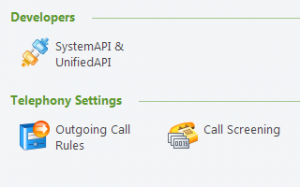 In the past week, we reached an important milestone – less than 100 bugs opened for the VoipPanel3 release. I know, it might sound a lot, but judging on the release size, they are a few.
In the past week, we reached an important milestone – less than 100 bugs opened for the VoipPanel3 release. I know, it might sound a lot, but judging on the release size, they are a few.
As the release will not take much longer, we are opening a series of short blog articles that describe the most important technical changes in VoipPanel3. We will focus on the changes that can affect you in a way or another.
Let’s start with the APIs. Many deployments use the APIs for provisioning operations (SystemAPI) or for controlling calls (CallAPI).
We believe that the API is one of the most important parts of VoipPanel, therefore it received significant attention in the new version. The API is part of a standard API layer that will be shared between all our future products.
Please consider the following facts:
- The new API is called UnifiedAPI and it is REST based. Even more, it’s compatible with the OpenSocial standard (you will find out later why).
- UnifiedAPI is made of services, for example the new Call service controls phone calls and has more functionality than the existing CallAPI.
- The new API is dramatically faster and more reliable. The API is built on a stack of services, what you see and work with is the standard REST interface. It is also distributed across multiple nodes (we will talk about this as well).
- We will provide example clients for most popular programming languages (existing examples were converted and standard client libraries created).
What about Legacy?
- SystemAPI will still be preserved for the next two years to support our customers, but strategically not much investment will go into this SOAP based API. REST is so much better than SOAP…
- Even if we preserve the SystemAPI in VoipPanel3, there are backwards incompatible changes. These are mostly related to the management of the user accounts, that changed a lot in VoipPanel3 (see next article) and authentication+authorization (we will speak about this too).
- We have not been able to technically preserve the existing CallAPI, therefore you will have to convert your applications to the new service in Unified API (the effort is pretty small).
We are welcoming feedback. Please comment and we will answer all questions regarding the APIs.






